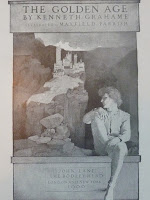RUMPS AND VOICES
I'm about to order Jan Needle's: RUMP OF RUMP HALL - THE RISE OF RONALD T RUMP. Having always loathed "THE WIND IN THE WILLOWS" (all the animals seemed to be middle-aged or elderly clubbish gentlemen - not my scene) I love Jan's satires, and know I'm going to enjoy this one.

Having said that, I do, accidentally, own a copy of one of Kenneth Grahame's lesser-known works: THE GOLDEN AGE, first published in 1899, with illustrations by Maxfield Parrish (I believe he went on to produce biscuit tin lids which are now collectors' items). Here is Graham's lost childhood in idyllic English countryside.
In parts, it's a funny book, with small boys' fantasy games along with inscrutable aunts and amusing elderly gents, but it's also sad, full of nostalgia for a world that was rapidly vanishing, and as with everything written around that period and later, there's the shadow of the First World War just around the corner - impossible, with hindsight, to read this stuff and not be aware of that horrendous ghost in the room. My edition is possibly valuable, and will soon go to Oxfam to help the victims of newer wars, because the one that was supposed to end them all never succeeded in doing so.
I've been having a private bookfest recently - meant to go to the film of "THE GIRL ON A TRAIN", then decided to read the book first, so did (Kindle version), after which the film became redundant. It's certainly a page-turner, kidnapping hours of my time, and causing my Kindle to run out of charge about halfway through, but not a book I'd wish to re-visit. For years, I've been a fan of the late Ruth Rendell, because of the complexities of her plotting, but also for the depth of her psychological understanding of her characters, which I didn't find in this. I was also a bit perplexed by its title. The story involves three very adult women, so where was the girl? I suppose that "THE WOMAN ON THE TRAIN" mightn't have been so sexy, but if the story'd featured three men, would it have been called "THE BOY ON A TRAIN"? I think not.
I also read "THE CURIOUS TALE OF THE LADY CARABOO", Catherine Johnson's Young Adult novel based on the real story of an impoverished, mixed race girl who re-invents herself as a Javanese princess and fools a wealthy, and kindly, family into caring for her. In the book, Catherine's given her a satisfyingly happy ending. I think her historical life might have been quite different, but the concept of re-inventing yourself as something else is a very powerful one. There are shades of self-help theories in this - if you play the part of an exotic princess for long enough, you might become one. How do actors psychologically deal with 'becoming' a character and then morphing back into their real selves? How do fraudsters? Because in order to create a convincing lie, you have to, in some subtle way, also con yourself.
There are people who choose to read nothing but non-fiction, because fiction's made up lies and fairytales. Writers invent characters, and the best of them become intimately involved with their creations and through them express things universal. There are uncomfortable links, though, in what we do, to the voices heard by schizophrenics, and to people with multiple personality disorders. At present, in developing my screenplay, I've been forced to delve deeply into the personalities of two girls (and yes, these two are young girls, rather than women) who don't actually exist - I made them up a long time ago. I have a close friend whose daughter suffers from schizophrenia, and the voices she hears are both 'real' and life-destroying. What did Joan of Arc hear that sent her, young and inexperienced, into battle? And what of those who are 'possessed' and then respond to exorcism? What very complex animals we are.
Lastly, I'm dipping into Jan Morris's exquisite book on Venice, which I go back to from time to time. If you don't know it, then you have a treat in store.

Comments
Any road up, the book's coming down the day after the election, so it might end up in a virtual Oxfam along with TWintW. Don't agree with you about Grahame's opus, though. When I read it as a kid I found it boring, but as an adult I loved it. Politically, I just HAD to do a rewrite!
(I haven't been able to see properly out of my left eye for about a year but this week my vision suddenly came back and when I went back to Moorfields the surgeons were delighted.)